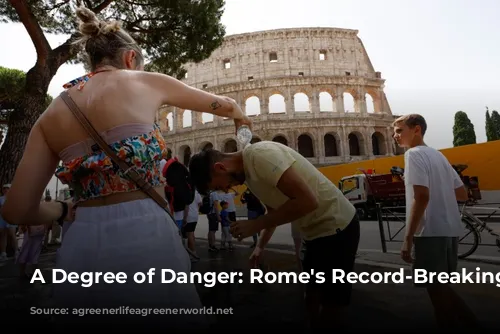A single degree may seem insignificant in everyday life, but in the world of climate science, it can be a matter of life and death. Think of it like this: one degree can mean the difference between a comfortable summer day and a scorching inferno.
On July 18th, 2023, Rome, Italy, experienced a record-shattering heatwave that sent temperatures soaring to unprecedented levels. The city’s previous temperature record was obliterated by a full degree Celsius. This wasn’t just a typical summer heatwave; it was a stark warning about the changing climate.
A City Under Siege: Rome’s Unprecedented Heat
Rome, a city known for its history and beauty, has always weathered extreme temperatures. But this heatwave was unlike anything experienced before. On that fateful day, the sun blazed down on Rome, turning it into a furnace. The city’s thermometers climbed to record-breaking heights, far exceeding any previous records. Rome reached a staggering 41.8 degrees Celsius, breaking the previous record set during the infamous 2003 European heatwave by a whopping one degree.
Beyond Discomfort: The Impacts of Extreme Heat
The discomfort caused by the heatwave went far beyond mere discomfort. Rome’s most vulnerable populations, including the elderly and those with pre-existing health conditions, were at increased risk of heat exhaustion, heatstroke, and dehydration. This scorching heat also took a toll on the city’s agriculture, putting stress on crops and exacerbating water scarcity. It was a double whammy for Italian farmers already struggling with persistent drought conditions throughout 2023.
A Global Trend: The Growing Threat of Heatwaves
This record-breaking heatwave in Rome was not an isolated incident. Heatwaves are becoming more frequent and intense globally, as predicted by climate models. The increasing greenhouse gas emissions and global warming are fueling these extreme weather events. The searing temperatures experienced in Rome serve as a potent reminder to policymakers and governments of the urgent need to address climate change and invest in sustainable practices.
A Call to Action: Mitigating the Impacts of Climate Change
In response to such extreme weather events, governments and communities are being urged to take proactive measures to minimize the impacts of future heatwaves. This includes implementing comprehensive heatwave response plans, enhancing urban infrastructure to reduce heat island effects, promoting energy efficiency measures, and raising awareness about the urgent threat of climate change.
The World is Watching: A Global Wake-Up Call
The UN Secretary-General, Antonio Guterres, has sounded the alarm, warning that climate impacts are a wake-up call for humanity. Events like Rome’s record-breaking heatwave are exactly the kind of events he referred to.
Rome and Italy are not alone in their struggle with extreme heat. Spain recently recorded its highest ever land-surface temperature. Much of southern Europe, along with large parts of the United States, Canada, and China, are currently grappling with unprecedented extreme heat, a stark manifestation of climate change’s devastating impacts. Policymakers and politicians are left pondering how to best mitigate the impacts of the climate crisis now and in the future. The world is watching, and time is running out.
